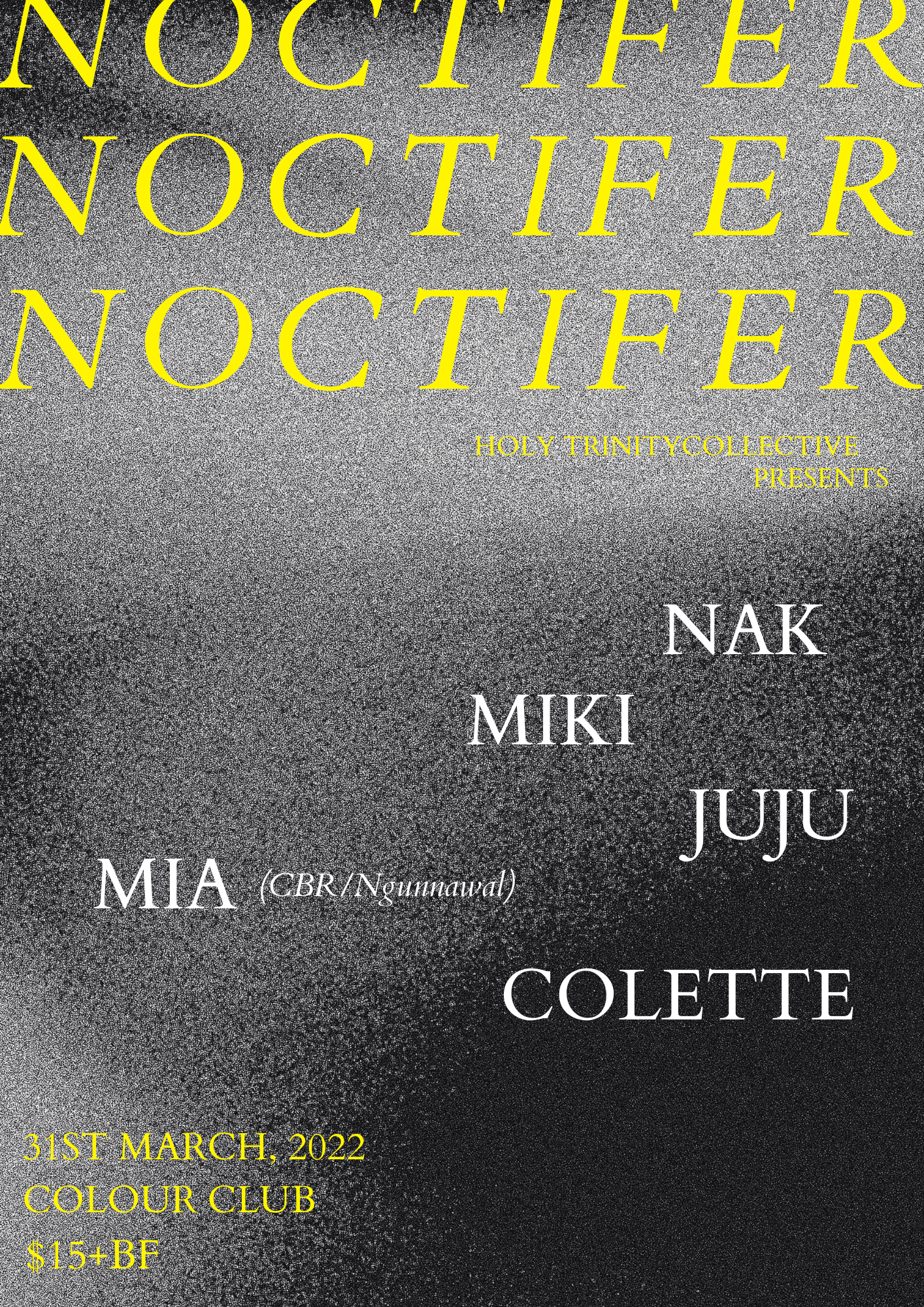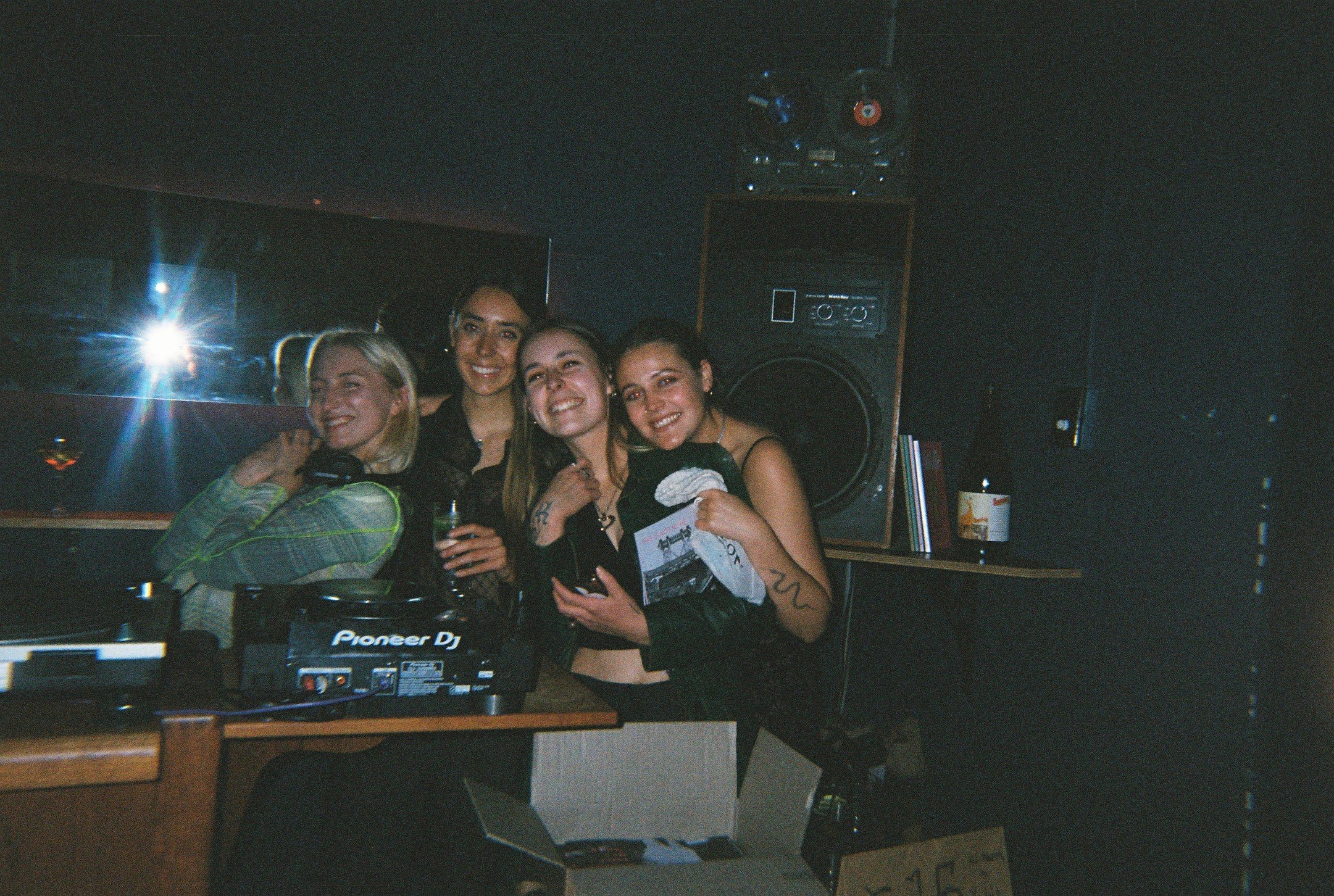Holy Trinity Collective
Philippa Conlon (she/her), Maree Pearson (she/her) & Stephanie Broadbent-Smith (she/her)
What are your thoughts on the electronic music scene in Naarm?
P: Moving to Melbourne definitely opened up this scene for me, it has just become a huge space that all of my friends are part of in one way or another - in that sense, i find it such an awesome community and a super excited space to be a part of because its always happening, always changing and super creative. On the other side of it, as a woman and someone who isnt a dj, the scene can be slightly more intimidating and unapproachable.
M: The electronic music scene in Naarm at present is, I believe, a really exciting place to be. I think we are in this somewhat ‘renaissance’ period after the hardship that has been the last two years, and people are more than ready to get back up and running at full force. I recall a friend saying that this point of time we are in now is highly reminiscent of the second summer of love, with the rise of acid house in the UK haha. Whilst inherently very different, I think they had a point in the fact that the electronic music scene in Naarm particularly, has had a huge resurgence post covid and is providing a lot of space for new and upcoming artists and promoters. Even though a lot has changed in the scene’s gender diversity, I still see lineup after lineup boasting tokenistic efforts in displaying any kind of diversity as a whole. As Pip says, being on the other side can be really quite intimidating and trying to establish yourself feels almost overwhelming. It’s also important to note that whilst issues of gender diversity continue through the music industry as a whole, there are many others that need further addressing and vocalisation such as greater representation of BIPOC and First Nations people.
S: Personally, the electronic scene is still a very new and exciting discovery for me. In the past I would try and see a different band a week whatever the genre - jazz, country, rap, pop. But opening up to the electronic community in Naarm has been so energising. I think the accessibility of being able to open your laptop, borrow some decks and make your own music mark is something that I started to appreciate during the lockdowns, especially seeing all the new artists charging through. And I think with Holy Trinity and the music industry comes great responsibility in acknowledging that we are living and creating on stolen land, and we benefit from the systems of colonialism every day. Dismantling these systems and Paying The Rent are core values of Holy Trinity, amongst other key values such as gender-diversity.
May I ask, what inspired the name? So badass.
M: I believe we were all a few wines deep when Stephanie suggested Holy Trinity.
S: Haha yes I had the idea while brushing my teeth one morning and thought it was reminiscent of the Riot Grrrl movement, which is deeply influential for us all and our collective. And since there are three of us it worked perfectly! I pitched it to Pip and Maree one evening at the pub and we all agreed it was the one.
Who can be a part of Holy Trinity Collective?
M: Within our ethos as a collective, we focus on female identifying and GNC artists and contributors from Naarm with the goal to create a safer and more diverse space in the local scene. So anyone who feels like they identify under that scope and wants to be apart in any kind of creative aspect….we would loveee to have you <3
Combatting the predominantly male-held spaces of DJing, producing and even event organising is SO important for the music industry - so what you're doing is incredibly inspiring and much needed! What are your aims for the future?
S: Hopefully some more events! And we are planning on producing our second issue of our zine which will be a fun accompaniment to any events we do.
What would you say or wish to other aspiring female or GNC DJ artists?
P: Anything you put your mind to, you can achieve. I think having this attitude can be incredibly infectious and what you put out into the world will come back to you. Surrounding yourself with people who have a similar mindset to you will provide a great support system for any endeavours.
M: Be you, do you. It’s so important to be authentically yourself and the passion and excitement that you portray for the industry will shine through.
S: It can be quite disheartening when you can’t see yourself reflected back in certain spaces, especially the music industry. And sometimes you need to keep your ear to the ground to find a like-minded community, or even carve your own one out - but it will find its way to you. Don’t be afraid to put yourself out there, even if it may feel silly at times.
Hey Pip, Maree and Stephanie! Tell me a bit about yourselves!
P: We all met at RMIT, doing our uni course (music industry). We just instantly clicked, and all three of us just shared a passion for the music industry and creating spaces and collaborating and it just seemed to go from there. Maree and I grew up in Canberra so there was that connection, Stephanie is a Melbourne gurl but we all just realised we are super similar in the way we work and what we want out of the music industry.
I recently read, "God Is a DJ”: Girls, Music, Performance, and Negotiating Space" by Geraldine Bloustien, which talks about the history of gender inequity in both music, and more specifically DJing. How did Holy Trinity Collective come to be? Was it inspired by your own personal experiences?
P: something that we bonded over when we first met was (sadly) a shared experience of imposter syndrome. Our uni course, although super inclusive, did echo some elements of the wider issue of gender inequality within the music industry. As a woman, I felt like I had to prove myself more, prove that I deserved to be there. I think this is something women and GNC artists constantly feel in the music industry. At uni we were also being taught the history of music and specifically DJing by some super amazing women who really inspired us to challenge these issues. We wanted to create something that addressed this very issue.
M: Haha in all honesty I think we still bond over that mean little imposter syndrome. I know I’ve found through a lot of readings we have done throughout our degree pretty disheartening when laid out in front of you,
S: Yup I third that old imposter syndrome. But I have noticed for myself, since creating Holy Trinity, I have felt it somewhat less so. I feel so supported by Pip and Maree and we have eachothers backs no matter what. That has been such a rewarding part of our collective that I hope comes across in our events in some way.
Highly personal opinion, but I've always found there to be a much funner, safer vibe when a female or GNC person is on the decks. Would you say the same? And, how was the atmosphere at your first event at Thank You?
M: Hmmm, I think this is a really tricky question to answer! The sense of camaraderie that we felt at our first event at TYB was truly awesome, and I think that definitely was reflective of the incredible people that were a part of it - that of which were all female identifying and GNC. I don’t think I would go so far as to say that that feeling and space is exclusive to events like ours, but the sense of community and atmosphere that all female identifying/GNC lineups tend to foster is for sure unique and something that I know we all love.
S: I would definitely agree with this to some extent. As someone who is relatively new to the electronic scene in Naarm, I felt noticeably more relaxed going to shows with women-identifying/gnc dj’s on stage. And the same applies to bands. It felt like that by seeing them up there, I was allowed to take up space on the dancefloor unapologetically.
Are you going to be picky about the venues / outside people you work with?
S: I think that when planning future events we will keep looking inwards at our values as a collective such as safety, line-up diversity etc. When choosing venues and people to work with, our values have really guided us. We just want everyone who comes to our dancefloors to feel safe and respected in an environment that historically can be the opposite, so if we can achieve that with future events then that is quite a special thing.








